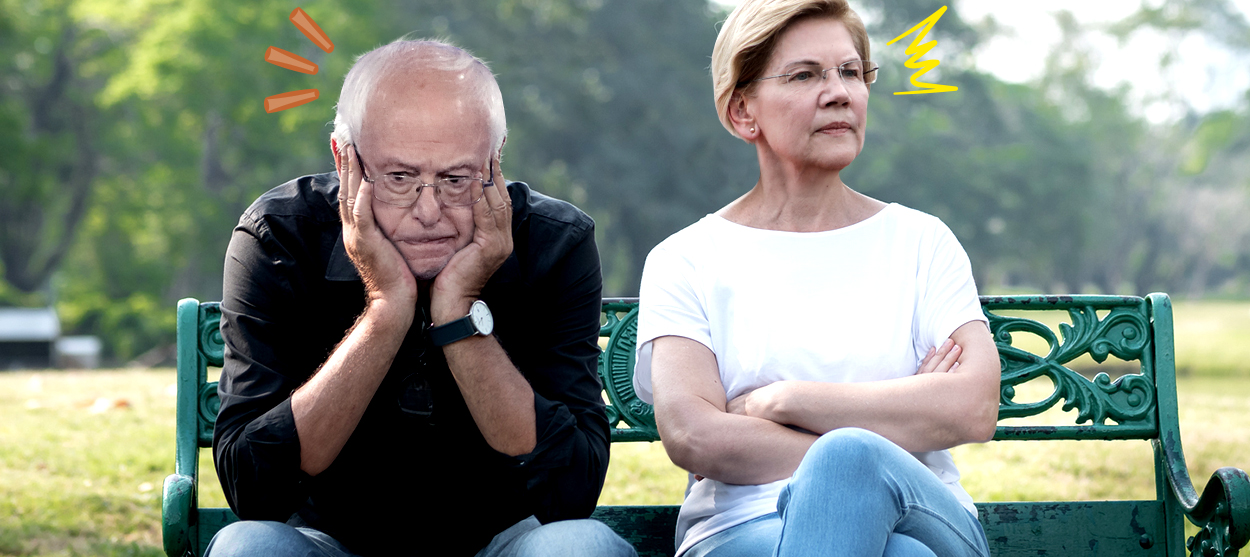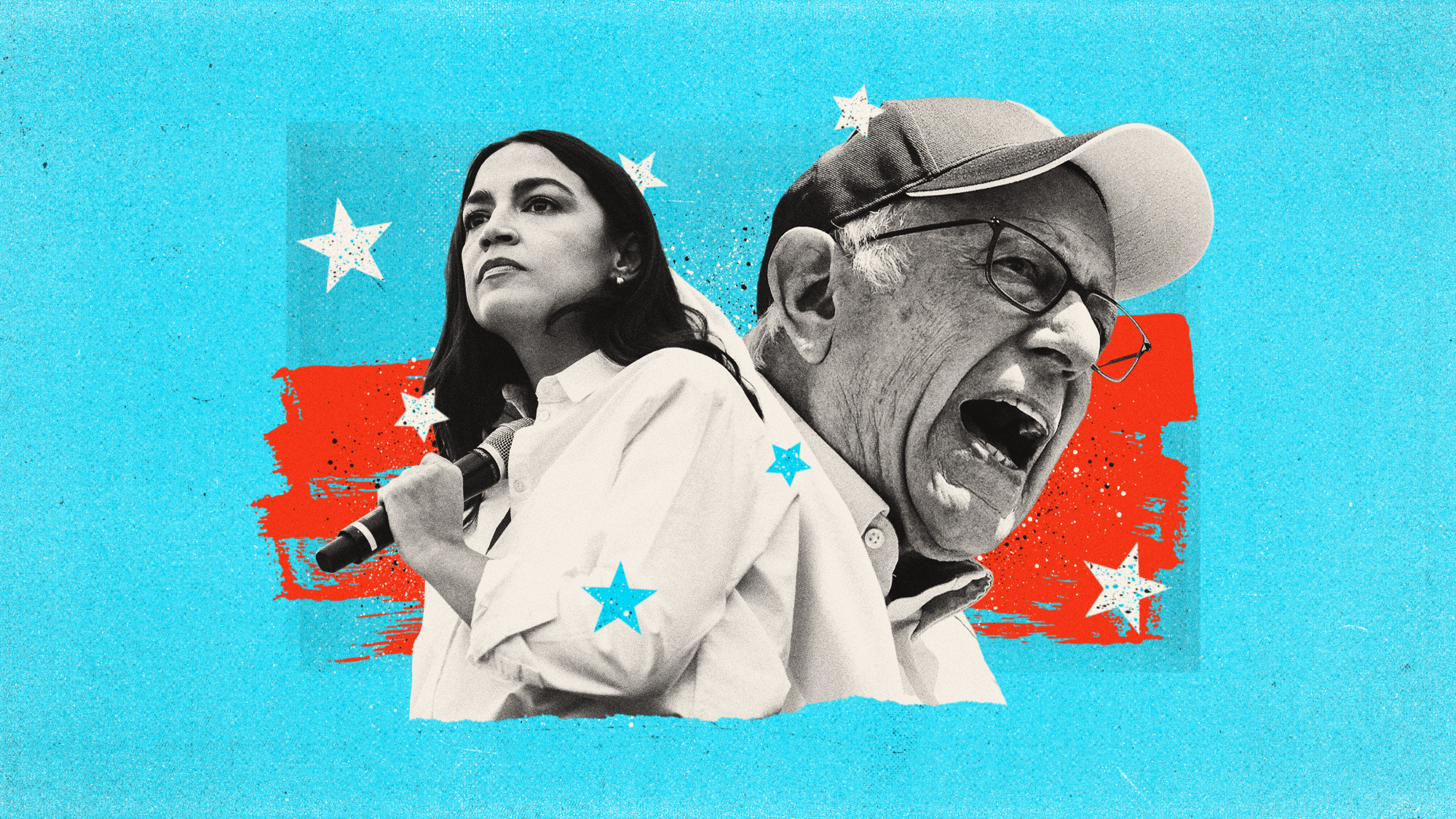Of course Warren and Sanders are fighting
Trouble in primaries paradise


A free daily email with the biggest news stories of the day – and the best features from TheWeek.com
You are now subscribed
Your newsletter sign-up was successful
A few months from now, there is a real chance that Sen. Elizabeth Warren (D-Mass.) will be the Democratic nominee for president. There is also a real chance that Sen. Bernie Sanders (I-Vt.) will be the nominee.
One thing is certain: It cannot be both of them.
So it shouldn't be surprising that the two candidates — longtime friends and political allies, we've been told — have started taking shots at each other now that the Iowa caucuses are just a few weeks away. There is a more-in-sadness-than-in-anger quality to the fight that is now bubbling up, but the fight was inevitable nonetheless. Elections are winner-take-all affairs. The losers go home. After a year of campaigning and debating, neither Sanders nor Warren want to go home. In our system, you can't do politics without dabbling in conflict and contrasts.
The Week
Escape your echo chamber. Get the facts behind the news, plus analysis from multiple perspectives.

Sign up for The Week's Free Newsletters
From our morning news briefing to a weekly Good News Newsletter, get the best of The Week delivered directly to your inbox.
From our morning news briefing to a weekly Good News Newsletter, get the best of The Week delivered directly to your inbox.
Let's back up and explain how we got to this point. The New York Times and CNN both reported, using anonymous sources, on a 2018 meeting in which Sanders purportedly told Warren that a woman cannot win the 2020 presidential election against President Trump. Sanders denied the allegation — calling it "ludicrous" — but Warren confirmed the story.
"I have no interest in discussing this private meeting any further because Bernie and I have far more in common than our differences on punditry," Warren said.
It probably isn't a coincidence that the Times and CNN stories appeared about a day after Politico reported the Sanders campaign was distributing anti-Warren talking points to campaign staffers, instructing them to tell Democratic primary voters that Warren has little chance of appealing to swing voters in a campaign against Trump.
Sanders offered a non-denial denial. "We have hundreds of employees. Elizabeth Warren has hundreds of employees," he told the Times. "And people sometimes say things that they shouldn't."
A free daily email with the biggest news stories of the day – and the best features from TheWeek.com
Why shouldn't they?
It's true that plenty of Democrats are nervous about the prospect of open disagreement between Sanders and Warren — worried that a battle between the two will divide the party or give Trump ammunition to use during the general election campaign next fall. "You both are progressive champs & our movement needs to see you working together to defeat your corporate Dem opponents — not attack each other," Democracy for America tweeted on Monday, pleading for unity. "Progressives will win in 2020, but only if we don't let the corporate wing or Trump divide us." In other words, progressive Democrats want unity, now.
But that's impossible. The voting hasn't started yet. For Sanders to win, Warren will have to lose — and vice versa. It's possible that both of them might lose to former Vice President Joe Biden. No matter what scenario you conjure, though, the end result is the same: There can be only one winner.
To win elections, politicians like Sanders and Warren must prove to voters that they are better than the other candidates, even if those candidates are otherwise friends. That message inherently means the other candidates are worse. Sometimes campaigns, especially in primaries, leave that contrast implicit — and Sanders and Warren have gone to great lengths until now to avoid criticizing each other — but usually the "I'm-better-they're-worse" message is made explicit indeed. The process is divisive.
That process doesn't automatically give Republicans a win over Democrats. Sanders gave Hillary Clinton a bruising battle for the Democratic nomination in 2016, but she still won the popular vote against Trump. Clinton, in turn, offered hard criticisms of Barack Obama during the 2008 primaries — and he won the general election rather easily. So Democratic fears about the Sanders-Warren divide are probably overblown.
Indeed, what those recent campaigns prove is that unity is possible in primary campaigns, but usually only after a victor has been crowned and the other candidates — and their supporters — have accepted their losses and are ready to be team players again. Sanders campaigned for Clinton in 2016; Clinton became Obama's secretary of state.
Most polls rank Sanders and Warren among the top three Democratic candidates. Each is vying to become the progressive choice for voters who reject Biden's moderation. So this battle was coming, sooner or later. Don't worry, Democrats — once the dust has settled, everybody can be friends again, and allies in the effort to remove Trump from office. Until then, though, it's time to do politics.
Want more essential commentary and analysis like this delivered straight to your inbox? Sign up for The Week's "Today's best articles" newsletter here.
Joel Mathis is a writer with 30 years of newspaper and online journalism experience. His work also regularly appears in National Geographic and The Kansas City Star. His awards include best online commentary at the Online News Association and (twice) at the City and Regional Magazine Association.
-
 The ‘ravenous’ demand for Cornish minerals
The ‘ravenous’ demand for Cornish mineralsUnder the Radar Growing need for critical minerals to power tech has intensified ‘appetite’ for lithium, which could be a ‘huge boon’ for local economy
-
 Why are election experts taking Trump’s midterm threats seriously?
Why are election experts taking Trump’s midterm threats seriously?IN THE SPOTLIGHT As the president muses about polling place deployments and a centralized electoral system aimed at one-party control, lawmakers are taking this administration at its word
-
 ‘Restaurateurs have become millionaires’
‘Restaurateurs have become millionaires’Instant Opinion Opinion, comment and editorials of the day
-
 The billionaires’ wealth tax: a catastrophe for California?
The billionaires’ wealth tax: a catastrophe for California?Talking Point Peter Thiel and Larry Page preparing to change state residency
-
 Mamdani vows big changes as New York’s new mayor
Mamdani vows big changes as New York’s new mayorSpeed Read
-
 Bari Weiss’ ‘60 Minutes’ scandal is about more than one report
Bari Weiss’ ‘60 Minutes’ scandal is about more than one reportIN THE SPOTLIGHT By blocking an approved segment on a controversial prison holding US deportees in El Salvador, the editor-in-chief of CBS News has become the main story
-
 Has Zohran Mamdani shown the Democrats how to win again?
Has Zohran Mamdani shown the Democrats how to win again?Today’s Big Question New York City mayoral election touted as victory for left-wing populists but moderate centrist wins elsewhere present more complex path for Democratic Party
-
 Millions turn out for anti-Trump ‘No Kings’ rallies
Millions turn out for anti-Trump ‘No Kings’ ralliesSpeed Read An estimated 7 million people participated, 2 million more than at the first ‘No Kings’ protest in June
-
 Ghislaine Maxwell: angling for a Trump pardon
Ghislaine Maxwell: angling for a Trump pardonTalking Point Convicted sex trafficker's testimony could shed new light on president's links to Jeffrey Epstein
-
 The last words and final moments of 40 presidents
The last words and final moments of 40 presidentsThe Explainer Some are eloquent quotes worthy of the holders of the highest office in the nation, and others... aren't
-
 The anger fueling the Bernie Sanders and Alexandria Ocasio-Cortez barnstorming tour
The anger fueling the Bernie Sanders and Alexandria Ocasio-Cortez barnstorming tourTalking Points The duo is drawing big anti-Trump crowds in red states
